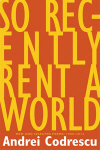So Recently Rent a World
Andrei Codrescu is a grown-up punk kid who cherishes the pleasures of life. Reading his poems is to enter into the mind of a brilliant classroom prankster (and at least part-time sex junkie). There’s a lot going on, and he has a lot to say about all of it. Zany, off-the-wall goofiness finds its place alongside serious astute reflection. This New and Selected is all the more cherished for exhibiting the range of the poet’s self-transformation over the course of his lifetime. This remarkable range is significantly reflected by way of the mini-introductions Codrescu offers before each book selection presented here, ranging from bibliographic comments to personal memoir of the particular time and place of the original composition-specific poems. As a result, this volume comes to represent Codrescu’s shot at a tour-de-force performance.
Andrei Codrescu is a grown-up punk kid who cherishes the pleasures of life. Reading his poems is to enter into the mind of a brilliant classroom prankster (and at least part-time sex junkie). There’s a lot going on, and he has a lot to say about all of it. Zany, off-the-wall goofiness finds its place alongside serious astute reflection. This New and Selected is all the more cherished for exhibiting the range of the poet’s self-transformation over the course of his lifetime. This remarkable range is significantly reflected by way of the mini-introductions Codrescu offers before each book selection presented here, ranging from bibliographic comments to personal memoir of the particular time and place of the original composition-specific poems. As a result, this volume comes to represent Codrescu’s shot at a tour-de-force performance.
Prolific to this day, Codrescu opens with a selection of recent work amounting to some 80+ pages. After that, the collection travels backward to start over again at the beginning with a selection from Codrescu’s first book, License to Carry a Gun, then advances chronologically forward, book by book, along with two sets of chapbook sections. This organization serves the work well, no doubt better than Codrescu’s original scheme—“to follow some of [his] ‘themes’”—would have. Luckily Coffee House books publisher, editor, and friend Allan Kornblum convinced him to go this other route. This organization scheme denies Codrescu any opportunity to window-dress his writing history. It also likely contributes to just how openly informative his mini-introductions are, being more reflective rather than attempting to re-shape the work to fit his current views.
The book opens with “signifier,” a near prose poem introduction to the new work, which startles with the clarity of its lucid complex extrapolation upon that forever ethereal pronoun for poets, “I”: “One day I had an idea. / This I you don’t know. / This I I barely knows.”
Following this evocation is a prose recital of his various encounters with manifestations of “I” across “a nearly half-century” of time, closing with the observation: “In the U.S., my adolescent Romanian ‘I’ met the emerging political ‘fuck you’ of the 1960’s. What happens after that is in English, and the story of this book.”
Codrescu began his poetic ascent in the United States at the tail end of the ‘60s as a recent émigré living in the Lower East Side of Manhattan, where he made his way through the ranks of the St Mark’s Poetry Project scene:
In New York in 1968 I met poets my age or slightly older, among them Ted Berrigan, Dick Gallup, and Anne Waldman. I learned English and poetry simultaneously, while working part-time at the Wilentz brothers’ venerable Eighth Street Bookshop. I quit writing in Romanian, French, and Italian, my poetry languages until then, and I tried to find a bridge between the dark metaphorical music of my first poets, and the pop insistence on the actual, physical world that was the passionate poetics of my new friends.
Codrescu became rather well known quite rapidly, soon crisscrossing the country with extended stays in San Francisco and points in between. After some time he began the peripatetic career of poet-professor eventually landing a longtime gig at Louisiana State University. Along the way, he edited the literary semi-underground sensational poetry zine Exquisite Corpse and the fairly solid anthology American poetry since 1970: up late, starred in the classic road trip documentary film Road Scholar, and became a periodic NPR news commentator. Among all poets of the United States, his distinct voice has arguably become one of the most publicly well recognized of any among his generation.
In his first published collection, License to Carry a Gun, the poems not only reflect his status as a recent immigrant but also reveal the gist of much that was to follow from his varied personae:
the flag is an adorable symbol
who never grew up.
like me.
a horny symbol too.
erected stripes touch the forked ends
of my soul.
—“the flag”
That Codrescu so self-identifies with the symbol of his new country comes as no surprise. He also says about the period, “America was nineteen years old in 1966 and so was I. I’d like to think that we’ve been in sync ever since.” His concern with identity remains paramount throughout his poems. It is easily one of the lasting values of his work, offering readers space to consider timely questions of nationality and immigration: how language blends with, alters/is altered by one’s self-identification(s). The result is an endlessly rich demonstration of how rewarding and varied the poetic crop is that arises upon exploration of such matters. As the last line of “the flag” rightfully celebrates with Whitmanic exuberance: “i praise this American possibility.”





